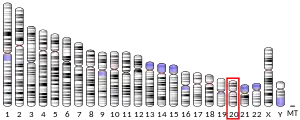| KCNK15 | |||||||||||||||||||||||||||||||||||||||||||||||||||
|---|---|---|---|---|---|---|---|---|---|---|---|---|---|---|---|---|---|---|---|---|---|---|---|---|---|---|---|---|---|---|---|---|---|---|---|---|---|---|---|---|---|---|---|---|---|---|---|---|---|---|---|
| Identifiers | |||||||||||||||||||||||||||||||||||||||||||||||||||
| Aliases | KCNK15, K2p15.1, KCNK11, KCNK14, KT3.3, TASK-5, TASK5, dJ781B1.1, potassium two pore domain channel subfamily K member 15 | ||||||||||||||||||||||||||||||||||||||||||||||||||
| External IDs | OMIM: 607368 MGI: 2675209 HomoloGene: 11179 GeneCards: KCNK15 | ||||||||||||||||||||||||||||||||||||||||||||||||||
| |||||||||||||||||||||||||||||||||||||||||||||||||||
| |||||||||||||||||||||||||||||||||||||||||||||||||||
| |||||||||||||||||||||||||||||||||||||||||||||||||||
| |||||||||||||||||||||||||||||||||||||||||||||||||||
| |||||||||||||||||||||||||||||||||||||||||||||||||||
| Wikidata | |||||||||||||||||||||||||||||||||||||||||||||||||||
| |||||||||||||||||||||||||||||||||||||||||||||||||||
Potassium channel subfamily K member 15 is a protein that in humans is encoded by the KCNK15 gene.[5][6][7][8]
This gene encodes K2P15.1, one of the members of the superfamily of potassium channel proteins containing two pore-forming P domains. K2P15.1 has not been shown to be a functional channel; however, it may require other non-pore-forming proteins for activity.[8]
See also
References
- 1 2 3 GRCh38: Ensembl release 89: ENSG00000124249 - Ensembl, May 2017
- 1 2 3 GRCm38: Ensembl release 89: ENSMUSG00000035238 - Ensembl, May 2017
- ↑ "Human PubMed Reference:". National Center for Biotechnology Information, U.S. National Library of Medicine.
- ↑ "Mouse PubMed Reference:". National Center for Biotechnology Information, U.S. National Library of Medicine.
- ↑ Kim D, Gnatenco C (Jun 2001). "TASK-5, a new member of the tandem-pore K(+) channel family". Biochem Biophys Res Commun. 284 (4): 923–30. doi:10.1006/bbrc.2001.5064. PMID 11409881.
- ↑ Vega-Saenz de Miera E, Lau DH, Zhadina M, Pountney D, Coetzee WA, Rudy B (Jun 2001). "KT3.2 and KT3.3, two novel human two-pore K(+) channels closely related to TASK-1". J Neurophysiol. 86 (1): 130–42. doi:10.1152/jn.2001.86.1.130. PMID 11431495. S2CID 14855672.
- ↑ Goldstein SA, Bayliss DA, Kim D, Lesage F, Plant LD, Rajan S (Dec 2005). "International Union of Pharmacology. LV. Nomenclature and molecular relationships of two-P potassium channels". Pharmacol Rev. 57 (4): 527–40. doi:10.1124/pr.57.4.12. PMID 16382106. S2CID 7356601.
- 1 2 "Entrez Gene: KCNK15 potassium channel, subfamily K, member 15".
Further reading
- Olsen JV, Blagoev B, Gnad F, et al. (2006). "Global, in vivo, and site-specific phosphorylation dynamics in signaling networks". Cell. 127 (3): 635–48. doi:10.1016/j.cell.2006.09.026. PMID 17081983. S2CID 7827573.
- Strausberg RL, Feingold EA, Grouse LH, et al. (2003). "Generation and initial analysis of more than 15,000 full-length human and mouse cDNA sequences". Proc. Natl. Acad. Sci. U.S.A. 99 (26): 16899–903. Bibcode:2002PNAS...9916899M. doi:10.1073/pnas.242603899. PMC 139241. PMID 12477932.
- Deloukas P, Matthews LH, Ashurst J, et al. (2002). "The DNA sequence and comparative analysis of human chromosome 20". Nature. 414 (6866): 865–71. Bibcode:2001Natur.414..865D. doi:10.1038/414865a. PMID 11780052.
- Karschin C, Wischmeyer E, Preisig-Müller R, et al. (2002). "Expression pattern in brain of TASK-1, TASK-3, and a tandem pore domain K(+) channel subunit, TASK-5, associated with the central auditory nervous system". Mol. Cell. Neurosci. 18 (6): 632–48. doi:10.1006/mcne.2001.1045. PMID 11749039. S2CID 25284693.
- Ashmole I, Goodwin PA, Stanfield PR (2002). "TASK-5, a novel member of the tandem pore K+ channel family". Pflügers Arch. 442 (6): 828–33. doi:10.1007/s004240100620. PMID 11680614. S2CID 27704471.
External links
- KCNK15+protein,+human at the U.S. National Library of Medicine Medical Subject Headings (MeSH)
This article incorporates text from the United States National Library of Medicine, which is in the public domain.
This article is issued from Wikipedia. The text is licensed under Creative Commons - Attribution - Sharealike. Additional terms may apply for the media files.



